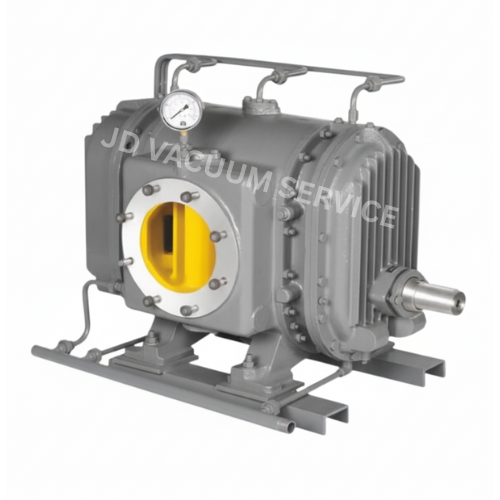twin lobe water cooled compressor
We manufacture highly durable Twin Lobe Water Cooled Compressors. The Water Cooled Compressor offered by us is manufactured from the best quality raw material. They are duly tested on different parameters so as to ensure their error-free working. We are regarded as one of the known water-cooled compressor Manufacturers and Exporters.

Twin Lobe Water Cooled Compressor is immensely used during the boosting and compression of different gases. Our product finds wide usage in E.T.P. and pneumatic conveying applications. Our compressor is widely used for various applications in cement, steel, water treatment, chemical, pulp and paper plant etc.
This product is made-up using good quality components and modern technology. We have also followed the set international quality norms. Our product is well appreciated by our precious customers.
- 100% Oil Free Air.
- Continuous Air Flow.
- Special Sealing
- Arrangement.
- Suitable for Gases
- Other Than air.
- Constant volume
- characteristics.
- Sulphitation Process- Sugar Industries.
- Filter Bed Agitation- Water Treatment Plants.
- Pneumatic Conveying- Cattle feed, Cement, Grain, Flour.
- Slurry Agitation.
- Gas Boosting.
- High Altitude Pressurized Chambers.
- Fertilizer Projects.
Body Material: MS
Brand: JD VACUUM SERVICE
Power Source: Electric
Frequency: 50 Hz
Voltage: 220 V
Surface Treatment: Paint Coated
High-Efficiency Twin Lobe Compression Technology
The Twin Lobe Water Cooled Compressor is engineered to deliver powerful, steady airflow with unmatched reliability. Its precision-machined twin lobe rotors create a smooth, pulse-free compression cycle that dramatically improves volumetric efficiency. As a result, industries that rely on continuous air or gas flow—such as pneumatic conveying, wastewater treatment, and chemical processing—experience higher productivity and lower operational downtime. Every rotation is optimized for maximum output, ensuring your facility enjoys consistent performance even under demanding loads.
Advanced Water-Cooled Thermal Control
Heat is the enemy of compressor performance—and this is where the water-cooled design truly shines. By continuously regulating internal temperatures, the integrated water cooling system prevents overheating, reduces wear on internal components, and extends the overall service life of the compressor. This means quieter operation, smoother airflow, and significantly improved energy efficiency. In high-temperature industrial environments, this advanced cooling keeps your system running at peak capacity, protecting both your equipment and your investment.
Built for Industrial Durability and Low Maintenance
Crafted from heavy-duty materials and designed for continuous operation, the twin-lobed water-cooled compressor offers exceptional durability with minimal maintenance requirements. The robust housing, corrosion-resistant components, and precision bearings ensure long-term reliability, even in harsh conditions. Moreover, its simplified design makes servicing fast and cost-effective, allowing your business to focus on productivity instead of frequent repairs. When you invest in this compressor, you invest in peace of mind, dependable uptime, and reduced operating costs.
| Details of Twin Lobe Air Water Cooled Compressor | |||||||||||||
|---|---|---|---|---|---|---|---|---|---|---|---|---|---|
| P1 mbar ----> | 500 | 600 | 700 | 800 | 900 | 1000 | |||||||
| MODEL | RPM | CMH | HP | CMH | HP | CMH | HP | CMH | HP | CMH | HP | CMH | HP |
| JDRP 40 | 1440 | 128 | 5.5 | 126 | 6.5 | 124 | 7.5 | 122 | 8.5 | 120 | 9.5 | 118 | 10.5 |
| 2850 | 372 | 10.5 | 367 | 12.6 | 362 | 14.5 | 358 | 16.3 | 354 | 18.3 | 350 | 20.4 | |
| JDRP 60 | 1440 | 590 | 17.0 | 580 | 20.0 | 570 | 23.0 | 560 | 26.0 | 555 | 29.0 | 550 | 32.0 |
| 2000 | 880 | 23.0 | 870 | 27.0 | 860 | 31.0 | 850 | 35.0 | 840 | 39.0 | 835 | 43.0 | |
| JDRP 150 | 980 | 1290 | 34.0 | 1270 | 40.0 | 1250 | 46.0 | 1230 | 53.0 | 1220 | 59.0 | 1210 | 65.0 |
| 1450 | 1990 | 51.0 | 2010 | 60.0 | 1980 | 69.0 | 1960 | 78.0 | 1940 | 87.0 | 1920 | 96.0 | |
| JDRP 300 | 725 | 2550 | 66.0 | 2500 | 78.0 | 2450 | 90.0 | 2400 | 102.0 | 2360 | 114.0 | 2320 | 125.0 |
| 980 | 3610 | 91.0 | 3570 | 107.0 | 3520 | 123.0 | 3480 | 139.0 | 3440 | 155.0 | 3410 | 170.0 | |
